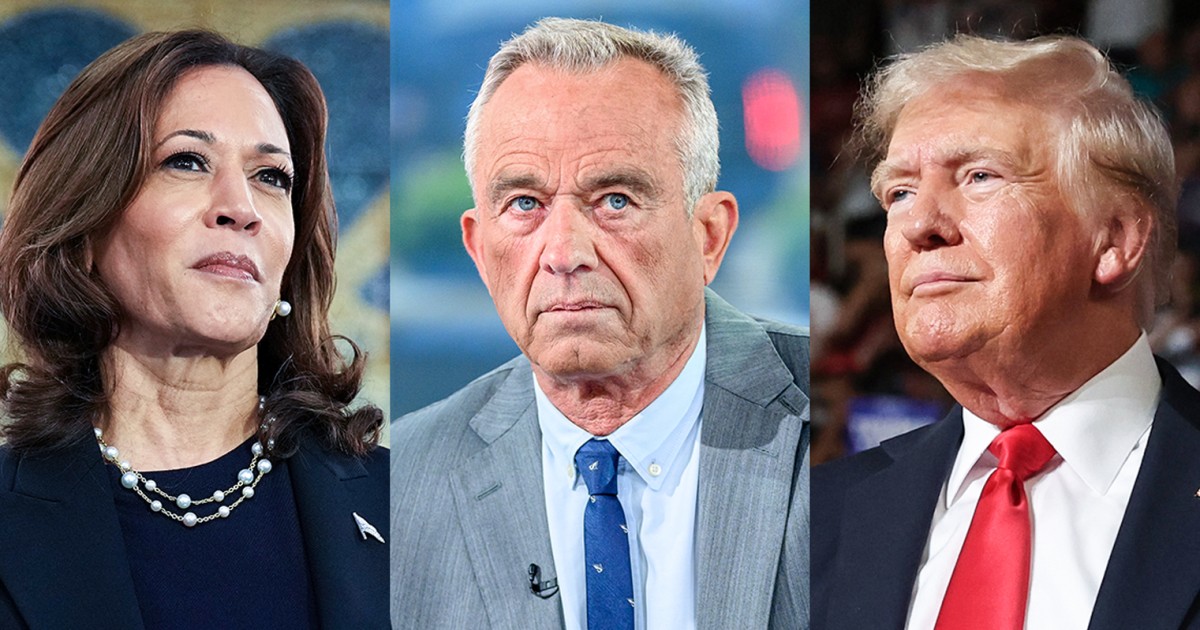The assassination attempt on Donald Trump, President Joe Biden’s departure from the race, Vice President Kamala Harris’ jump to the top of her ticket, two vice-presidential picks and two conventions have all shaken up the election in the last six weeks. Now, independent Robert F. Kennedy Jr.’s possible exit could be the next big event.
His own running mate is talking about weighing whether to drop out, and now his campaign is preparing a big speech on Friday.
Polls show that a Kennedy withdrawal would probably help Trump more than it hurts him. But if it does, it’s at the margins — though small margins have ended up deciding recent presidential elections.
Here’s what the polling tells us:
Republicans like Kennedy more than Democrats do
That’s clear from the national NBC News poll. In January, Kennedy held net-positive ratings from Republicans (+18) and independents (+4), while Democrats viewed him mostly negatively (-25).
The spread has only gotten starker since then. Fast forward to July’s NBC News poll — conducted before Biden’s exit — when Kennedy was in positive territory with only Republican voters (+11), while he was negative among independents (-18) and Democrats (-38).
Bottom line: Kennedy appeals more to Republican voters, and his standing has declined significantly with independents.
Kennedy attracts almost all of Trump’s third-party defectors
July’s national NBC News poll also shows how the ballot changes from one with just the two major nominees to an expanded ballot that includes Kennedy.
In that poll — which, again, was taken before Biden’s exit — Trump was ahead of Biden by 2 points among registered voters, 45% to 43%, with 12% wanting another candidate or unsure about their vote.
And when third-party candidates were included, Trump’s lead grew to 3 points, 40% to 37%, with Kennedy getting 10%, Jill Stein (Green Party) 3%, Chase Olive (Libertarian) 2% and Cornel West 1%.
In that six-way ballot, Trump kept 87% of the voters who backed him in the head-to-head contest, while 10% of his voters went to Kennedy, 1% went to Stein and 1% went to West.
By contrast, Biden kept 85% of his two-way support, while 6% went to Kennedy, 3% to Stein, 2% to Oliver and 1% to West.
Other polls since then have shown a similar trend, with Kennedy drawing in more voters who said they would pick Trump than Harris on a two-way ballot.
But not every survey has lined up the same way, including some of the ones highlighted below.
The third-party vote has gotten smaller since Biden’s exit
Since Biden’s departure from the race, the total share of voters supporting Kennedy and third-party candidates in general has declined, according to national and battleground polls. More voters have been choosing Harris or Trump instead.
In the national Washington Post/ABC News/Ipsos poll, for example, Harris got support from 47% of registered voters, Trump 44%, Kennedy 5%, and Stein and West a combined 2%.
What’s more, in an example of the varied effects Kennedy has in different surveys, that poll shows Kennedy getting 3% of the voters who support Harris in a two-way matchup, while he gets 2% of Trump’s backers.
And in the New York Times/Siena College battleground polling of Arizona, Georgia, Nevada and North Carolina, Kennedy’s combined share of the multicandidate vote was just 4% — with the same percentage of Harris (3%) and Trump (3%) backers supporting him.
Bottom line: The potential share of Kennedy backers is smaller than it used to be. But that still could be decisive in a close election.

